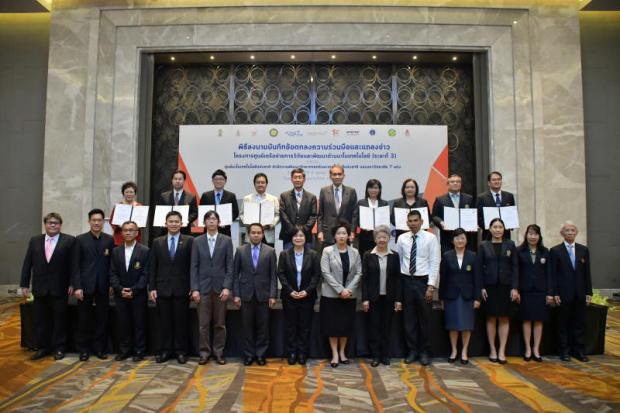
The National Nanotechnology Centre (Nanotec) signed a memorandum of understanding (MoU) with 11 network centres from seven universities for phase 3 of the Research Network for Nanotechnology Project.
The agreement aims to build a research network in nanotechnology and encourage the real use of R&D works to ultimately benefit the nation, both economically and socially.
Phase 3, starting this year, aims to form specific research networks that would have the common interest in research topics for both Nanotec and network centres, which in turn could co-supervise graduate students and further develop practical works that could be utilised commercially.
Wannee Chinsirikul, executive director of Nanotec, said the targeted area consisted of five research frameworks are nanotechnology for medical and public health; environment; food and agriculture; metrology and characterisation; and energy.
Nanotec is collaborating with 11 network centres from seven universities -- Mahidol University, King Mongkut's University of Technology Thonburi, Chulalongkorn University, Vidyasirimedhi Institute of Science and Technology, Kasetsart University, Khon Kaen University, and Suranaree University of Technology.
The collaborations among Nanotec and the universities participating in this network centre project are one of the major missions that could promote R&D according to Thailand's Nanotechnology Roadmap, and the National Science Technology and Innovation Policy that is considered to be the master plan driving the country towards Thailand 4.0.
For the nanomedicine framework, Nanotec and the Ramathibodi Hospital plan to further develop the Nanotec diabetes diagnostic kit, with Ramathibodi Hospital carrying out clinical trials.
Nanotec with Siriraj Hospital are developing Lymphoma-targeted nanoliposome particles; and are working with the School of Bioresources and Technology at KMUTT to develop nanosensors for health monitoring purpose.
In environment framework, the centre works with the Environmental Engineering Faculty at Chulalongkorn University to develop the industrial wastewater treatment system via nanotechnology.
In food and agriculture framework, Nanotec is working with the Faculty of Science, Mahidol University, and Faculty of Science, Chulalongkorn University, to develop a portable sensor for heavy metals and contaminant gauging, and smart sensors and systems for agricultural purposes.